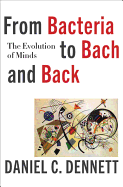
In From Bacteria to Bach and Back, philosopher Daniel C. Dennett (Consciousness Explained) uses a scientific approach to explore the evolutionary origins of human consciousness. Our minds tend to be difficult to study because they are so mind blowing--we are beings that are aware of ourselves and of everything we know, without necessarily knowing how. What could be the evolutionary benefit of such a complicated attribute?
Dennett incorporates modern science with ancient questions of human identity, and takes this trend to its natural conclusion. But it is one that couldn't (and didn't) exist before Darwin, the mapping of the human genome or the Internet: consciousness, Dennett says, is not for anything.
Natural selection was able to evolve the brain from amoebas to self-aware enigmas in much the same way computers repeat algorithms. A perfect system need not know its own purpose in order to achieve it. By putting forth a spectrum of scientific theories, from evolutionary biology to linguistics, Dennett illustrates that consciousness is not a survival mechanism but rather a random mutation of nature.
In one of his more elegant passages, he uses Alan Turing's early experiments in building computers as an allegory for how evolution gave humans such a complicated consciousness. Turing understood about computer code what natural selection understands about consciousness: "In order to be a perfect and beautiful computing machine, it is not requisite to know what arithmetic is." --Josh Potter

